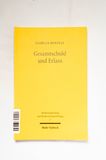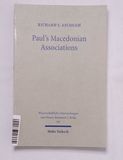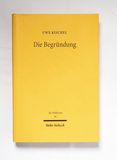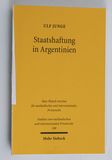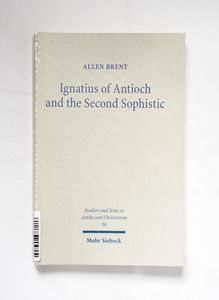
Ignatius of Antioch and the Second Sophistic : a study of an early Christian transformation of Pagan culture / Allen Brent
Netto: 52.95 €56,66€
inkl. MwSt. zzgl. Versand
Bearbeitungszeit: 3 Werktage
Sofort lieferbar (auf Lager)
1x Stück verfügbar
Buchzusammenfassung:
The letters of Ignatius of Antioch, whether considered genuine or pseudonymous, have been generally understood as addressing concerns and issues within the Church. Consequently, his language has been read as an expression of second century Judaeo Christianity or as a reply to Valentinianism, with little direct contact or concern with the surrounding pagan culture. Allen Brent submits Ignatius language to a comprehensive analysis and seeks to show that both conceptually, and in terms of the form of his arguments, his language game is clearly that of the pagan, Greek city-states of Asia Minor in the Second Sophistic. The author shows from a variety of evidence, both literary, epigraphic and iconographic, that Ignatius cultural background is in the world of the discourse of Hellenic autonomy against Roman imperial power, in the image-bearing mystery cults of the cities to whom he writes, in their embassies and Homonia treaties, and in their ideal of unity in a common culture expressed by their constitutions and cultural practices. Ignatius emerges as a brilliant missionary strategist, able to reshape ecclesial order in terms of secular social order and its conventions, whose work was scarcely comprehended by his more conservative Christian contemporaries and only later canonized by means of a gross distortion that obscured his original meaning.
FAQ zum Buch
Ignatius Konzepte wie „merismos“ und „evōsis“ sind im Text mit hellenistischen politischen und sozialen Begriffen verbunden, nicht direkt mit dem Gnostizismus. Sie entwickelten sich später in Richtung gnostischer Individualismus. Der Text verweist auf frühere Beispiele, die in der Entwicklung der Lehre Theodotus und der Marcosianer eine Rolle spielen. Es wird betont, dass Ignatius Begriffe nicht als direkte Ursprünge des Gnostizismus gelten. Dieses FAQ wurde mit KI erstellt, basierend auf der Quelle: S. 118, ISBN 9783161487941
Die Märtyrerprozession löste bei Ignatius die Reaktion aus, dass die Epheser Zeugen “inflammt wurden durch das Blut Gottes“. Dies geschah, weil er sich als Träger der göttlichen Herrlichkeit verstand und seine bevorstehende Märtyrertod als Vorzeichen darstellte. Dieses FAQ wurde mit KI erstellt, basierend auf der Quelle: S. 180, ISBN 9783161487941
Laut dem Text spielt die Bedeutung der dreifachen Amtsträger darin, dass sie die Kirche durch die Wiedergabe der laufenden Erlöseungsgeschichte im liturgischen Leben der Gemeinschaft schaffen. Der Bischof verkörpert die Gotteswürde, die Presbyterate erinnern an den Geist der Apostel, und die Diakone repräsentieren Christus, der vom Vater kommt und zu ihm zurückkehrt. Dieses FAQ wurde mit KI erstellt, basierend auf der Quelle: S. 43, ISBN 9783161487941
Der Text vergleicht das Verhalten der wandernden Sophisten mit flamboyanten medizinischen Praktikern, die bewusst Bilder der Vorrangstellung erzeugen. Beide gründen ihre Autorität auf spektakuläre Darstellungen, ähnlich wie die Sophisten, die angeblich über göttliche Kenntnisse verfügen. Dieses FAQ wurde mit KI erstellt, basierend auf der Quelle: S. 66, ISBN 9783161487941
Der Begriff „túros“ bezeichnet nach dem Text runde, tragbare Statuen, nicht nur bas-reliefs. Dies wird anhand von archäologischen Funden wie der Marcanus-Statue und epigraphischen Beispielen aus Ephesus verdeutlicht, die auf „túros“ als aufrecht stehende, runde Statuen hinweisen, im Gegensatz zu flachen Reliefdarstellungen. Dieses FAQ wurde mit KI erstellt, basierend auf der Quelle: S. 86, ISBN 9783161487941
Der Autor behauptet, dass Ignatius dreiordnungliche Auffassung der kirchlichen Ordnung für seine Zeitgenossen ebenso rätselhaft und individuell gewirkt hätte wie für Irenäus später. Er betont, dass der Mangel an Übereinstimmung mit der frühen zweiten Jahrhundert-Ordnung nicht als Argument dafür dienen kann, dass die Briefe später entstanden sind. Dieses FAQ wurde mit KI erstellt, basierend auf der Quelle: S. 38, ISBN 9783161487941




